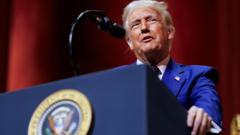In a bold political maneuver, Sinn Féin has announced plans to boycott the White House's St. Patrick's Day celebrations, a move that could strain relationships with influential American politicians and divide opinions within the Irish diaspora. Recently, former President Donald Trump made headlines for incendiary remarks regarding global conflicts, including threats against Ukraine and controversial policy proposals for Gaza. Sinn Féin's leadership, however, sees boycotting the event as a principled stance against Trump's actions, which many view as damaging.
Sinn Féin's Bold Stance: Forgoing St. Patrick's Day at the White House

Sinn Féin's Bold Stance: Forgoing St. Patrick's Day at the White House
Sinn Féin's decision to boycott the St. Patrick's Day celebration at the White House raises political stakes while challenging U.S. foreign policy.
Traditionally, the first and deputy first ministers of Northern Ireland visit D.C. for the festivities. This year, Michelle O'Neill, Sinn Féin's first minister, and party leader Mary Lou McDonald have opted out of the White House reception, amplifying their stance amid increasing public dissatisfaction with Trump's rhetoric.
The furore stems from Trump's recent proposal for a radical change in U.S. policy regarding Gaza, suggesting American control over the region, which invited backlash from international leaders and organizations. Alongside this, his labeling of Ukraine's President Zelensky as a dictator has further polarized opinions. While traditional parties, like the Democratic Unionist Party (DUP), tread carefully in their criticism of Trump, Sinn Féin is leveraging the opportunity to present themselves as the principled opposition.
As eight Irish ministers, including Taoiseach Micheál Martin, prepare for the U.S. visit, scrutiny will now shift to Deputy First Minister Emma Little-Pengelly, who may still attend the celebrations unless vetoed by O'Neill. This scenario raises questions about representation and the political narrative surrounding Northern Ireland's leadership in the United States as national sentiments grow against the backdrop of international conflict.
By taking this uncompromising stand, Sinn Féin positions itself amid a politically charged atmosphere, with implications for both domestic alliances and international relationships as they navigate this significant cultural event.
The furore stems from Trump's recent proposal for a radical change in U.S. policy regarding Gaza, suggesting American control over the region, which invited backlash from international leaders and organizations. Alongside this, his labeling of Ukraine's President Zelensky as a dictator has further polarized opinions. While traditional parties, like the Democratic Unionist Party (DUP), tread carefully in their criticism of Trump, Sinn Féin is leveraging the opportunity to present themselves as the principled opposition.
As eight Irish ministers, including Taoiseach Micheál Martin, prepare for the U.S. visit, scrutiny will now shift to Deputy First Minister Emma Little-Pengelly, who may still attend the celebrations unless vetoed by O'Neill. This scenario raises questions about representation and the political narrative surrounding Northern Ireland's leadership in the United States as national sentiments grow against the backdrop of international conflict.
By taking this uncompromising stand, Sinn Féin positions itself amid a politically charged atmosphere, with implications for both domestic alliances and international relationships as they navigate this significant cultural event.



















